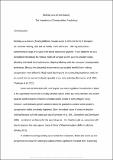| dc.contributor.author | Tomaino, Geoff | |
| dc.contributor.author | Teow, Jasper | |
| dc.contributor.author | Carmon, Ziv | |
| dc.contributor.author | Lee, Leonard | |
| dc.contributor.author | Ben-Akiva, Moshe | |
| dc.contributor.author | Chen, Charlene | |
| dc.contributor.author | Leong, Wai Yan | |
| dc.contributor.author | Li, Shanjun | |
| dc.contributor.author | Yang, Nan | |
| dc.contributor.author | Zhao, Jinhua | |
| dc.date.accessioned | 2021-10-27T19:52:35Z | |
| dc.date.available | 2021-10-27T19:52:35Z | |
| dc.date.issued | 2020 | |
| dc.identifier.uri | https://hdl.handle.net/1721.1/133392 | |
| dc.description.abstract | © 2020, Springer Science+Business Media, LLC, part of Springer Nature. Mobility-as-a-Service (MaaS) is based on the notion that consumers and transport providers access a centralized platform for the planning, payment, and management of trips and combines multiple modes of transportation designed to increase the efficiency of the system. MaaS offers substantial societal benefits, including the reduction of emissions, traffic congestion, road injuries, and the overall discomfort associated with travel, in addition to providing personalized transportation solutions. Since the delivery of these benefits hinges on the widespread adoption of MaaS platforms, we draw on consumer psychology for insight into the social and cognitive psychological factors that may hamper the adoption of MaaS, and their influence on consumer choices and perceptions. More generally, this paper highlights that transportation is a fertile context for consumer psychology research. | |
| dc.language.iso | en | |
| dc.publisher | Springer Science and Business Media LLC | |
| dc.relation.isversionof | 10.1007/s11002-020-09533-9 | |
| dc.rights | Creative Commons Attribution-Noncommercial-Share Alike | |
| dc.rights.uri | http://creativecommons.org/licenses/by-nc-sa/4.0/ | |
| dc.source | SSRN | |
| dc.title | Mobility as a service (MaaS): the importance of transportation psychology | |
| dc.type | Article | |
| dc.contributor.department | Massachusetts Institute of Technology. Department of Civil and Environmental Engineering | |
| dc.contributor.department | Massachusetts Institute of Technology. Department of Urban Studies and Planning | |
| dc.relation.journal | Marketing Letters | |
| dc.eprint.version | Author's final manuscript | |
| dc.type.uri | http://purl.org/eprint/type/JournalArticle | |
| eprint.status | http://purl.org/eprint/status/PeerReviewed | |
| dc.date.updated | 2020-08-31T12:03:37Z | |
| dspace.orderedauthors | Tomaino, G; Teow, J; Carmon, Z; Lee, L; Ben-Akiva, M; Chen, C; Leong, WY; Li, S; Yang, N; Zhao, J | |
| dspace.date.submission | 2020-08-31T12:03:38Z | |
| mit.journal.volume | 31 | |
| mit.journal.issue | 4 | |
| mit.license | OPEN_ACCESS_POLICY | |
| mit.metadata.status | Authority Work and Publication Information Needed | |
